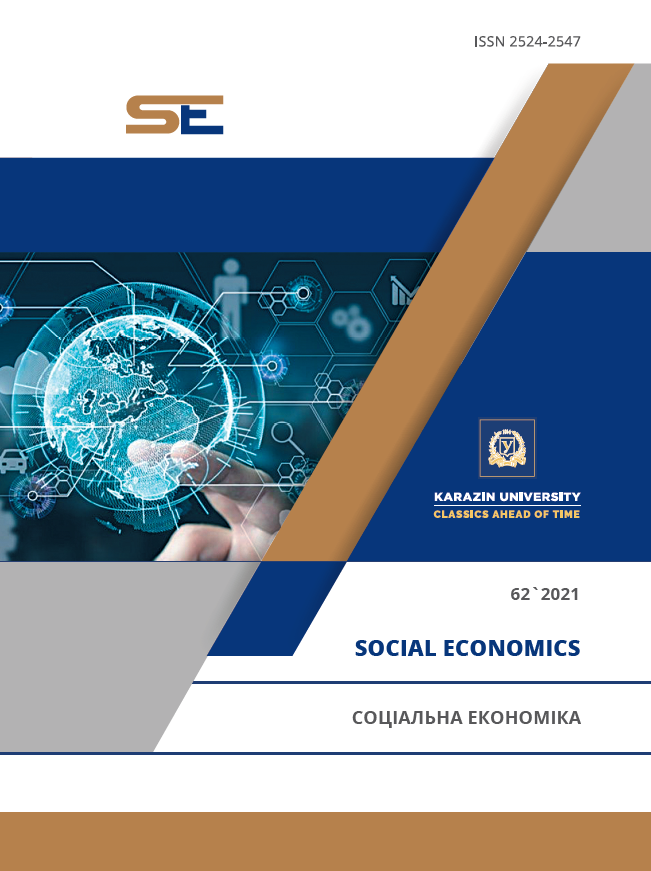ANTI-CRISIS BUSINESS MANAGEMENT IN THE DIGITAL ECONOMY
Abstract
The purpose of this article is to substantiate the theoretical and methodological foundations and practical recommendations for the development of anti-crisis management tools in the digital economy based on the cost criterion and intangible factors. Practice shows that the development of artificial intelligence, big data analytics, machine learning and the development of the mobile Internet open up new opportunities for enterprises and affect the business strategies of companies. The digital transformation of the economy has led to the emergence of challenges for management, which can be divided into the following groups: change in the business economy; changing the business model of the business; changes in business value factors. We substantiated that in the conditions of digitalization there is a need to form new anti-crisis tools, taking into account the features of both new digital companies and existing businesses, which adapt their activities in the conditions of digitalization. We have determined that the selection of anti-crisis tools in the digital environment will maintain a majority of cost indicators on the basis of which decisions are made, but the interpretation of these indicators changes as they adapt to assessing business performance in the digital economy. We believe that digital technologies are changing attitudes towards physical assets and increasing the role of intangibles. We substantiated that the main source of creating sustainable advantages of enterprises are intangible intellectual assets. We believe that the value of the enterprise obtained from intangible intellectual assets is equal to the difference between the market value of the enterprise and the value of tangible assets according to the model of valuation of real options. However, the model of real options indicates how much the value of the enterprise will increase with the effective use of intangible assets and does not give the absolute value of intangible assets. In this paper, we proposed the calculation of the lost benefit for owners from not taking into account the impact of intangible intellectual assets on the value of the enterprise.
Downloads
References
Malyy, I. (Ed.). (2017). Anti-crisis management of the national economy. Kiev. (in Ukrainian)
Adamska, O. (2018). Crisis management in the context of responding to regional challenges: theoretical and methodological aspect. Efficiency of public administration, 2(55), 30-38. (in Ukrainian)
Grigorieva, O. V., & Mishchenko, A. Yu. (2017). Crisis phenomena in the economy and their manifestations in the enterprise. Scientific Bulletin of Uzhhorod National University, 13, 76-79. (in Ukrainian)
Grinko, T. V. (2014). The essence and role of preventive crisis management in industrial enterprises. Efficient economy, 5, 11-21. Retrieved from http://www.economy.nayka.com.ua/?op=1&z=2981. (in Ukrainian)
Kuznetsova, G. V. (2018). Formation of the crisis management system at domestic enterprises. Bulletin of Transport Economics and Industry, 62, 312-319. (in Ukrainian)
Shataylo, O. A. (2019). Content characteristics of the crisis management system. Business Inform, 5, 217–226. (in Ukrainian)
Shvets, Yu. O. (2020). The mechanism of anti-crisis management of operational activities in mechanical engineering enterprises: the need for development and problems of use. Black Sea Economic Studies, 51, 131-137. (in Ukrainian)
Guk, O. V. (2015). Crisis management as a way to prevent bankruptcy. Economy: the realities of time, 6(22), 193-198. Retrieved from http://economics.opu.ua/files/archive/2015/n6.html. (in Ukrainian)
Bassova, O. O., & Aleshkevych, M. O. (2020). Anti-crisis measures to prevent bankruptcy of machine-building enterprises and ways to implement them in a competitive environment. Efficient economy, 4, 23-28. Retrieved from http://www.economy.nayka.com.ua/?op=1&z=7827. (in Ukrainian)
Moskvin, B. (2020). Bankruptcy as a mechanism of crisis management of the enterprise. Bulletin of KNTEU, 2, 58–68. doi: http://doi.org/10.31617/visnik.knute.2020(130)05. (in Ukrainian)
Bivainis, J., & Garskaité-Milvydiené, K. (2011). The System of Diagnostics of Bankruptcy Threat to the Enterprises. Business: Theory and Practice, 11, 3, 204-212. doi: https://doi.org/10.3846/btp.2010.23.
De Pamphilis, D. M. (2010). Mergers, Acquisitions, and Other Restructuring Activities. Burlington: Academic Press.
Brauer, M. F. (2013). The Effects of Short-Term and Long-Term Oriented Managerial Behaviour on Medium-Term Financial Performance: Longitudinal Evidence from Europe. Journal of Business Economics and Management, 14, 2, 386-402. doi: https://doi.org/10.3846/16111699.2012.703965.
Giriünas, L., Mackevicius, J., & Valkauskas, R. (2013). Analytical Study and Modeling of Statistical Methods for Financial Data Analysis: Theoretical Aspect. Journal of Security and Sustainability Issues, 3(1), 43-48. doi: http://dx.doi.org/10.9770/jssi.2013.3.1(5).
Bragg, S. M. (2012). Financial Analysis: A Controller’s Guide. New York: Wiley.
De Alencar, L. M., & Almeida, H. N. (2013). Economic Viability and Sustainability of Solidarity Economy Enterprises: A Case Study on the Technological Incubator of Popular Cooperatives of the Catholic University of Salvador. Entrepreneurship and Sustainability Issues, 1(2), 92-98. doi: http://dx.doi.org/10.9770/ /jesi.2013.1.2(3).
Giriünas, L., & Mackevicius, J. (2014). Evaluation of Frauds in Public Sector. Entrepreneurship and Sustainability Issues, 1(3), 143-150. doi: http://dx.doi.org/10.9770/jesi.2014.1.3(3).
Corrado, C., Haskel, J., Jona-Lasinio, C., & Iommi, M. (2018). Intangible investment in the EU and US before and since the Great Recession and its contribution to productivity growth. Journal of Infrastructure, Policy and Development, 2, 1, 11–36.
Haskel, J., & Westlake, S. (2018). Capitalism without Capital: The Rise of the Intangible Economy. Princeton University Press. Retrieved from http://www.pse-journal.hr/upload/files/pse/ /2020/1/mihaljek.pdf.
Bragg, S. M. (2012). Financial Analysis: A Controller’s Guide. New York: Wiley.




